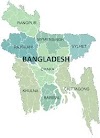Greater Bengal or Greater Bangladesh is a theory that claims that the People's Republic of Bangladesh aspires to form a larger historical undivided Bengal with Bengali speaking areas. There are the states of West Bengal, Bihar, and Jharkhand in eastern India, Orissa, and the states of Tripura, Assam, Meghalaya, Mizoram, Arunachal, Manipur, Nagaland, Sikkim as well as the Andaman Islands and the Rakhine State of Myanmar (formerly Arakan) -Make of part of the piece.
In January 1947, Sarat Chandra Bose resigned from the Indian National Congress in part in a protest of the partition of Bengal. He called for an independent Bengal from both India and Pakistan and formed his own political party, the Socialist Republican Party. Came in favor of Bengal which would consist of both East Bengal (present-day Bangladesh) and West Bengal (present West Bengal).
The acquisition of "Greater Bangladesh" (additional place of residence) is alleged to be the cause of large-scale illegal migration from Bangladesh to Indian states. In order to convert, some political parties in Bangladesh and the state of Bangladesh actively encouraged this illegal immigration, which resulted in the secession of these areas from India and the incorporation of Muslim-majority Bangladesh.
Bangabandhu Sheikh Mujibur Rahman wanted to incorporate the Indian state of Assam into Bangladesh to form a 'Greater Bangladesh'.Amar Bhushan, a former officer of the Research and Analysis Wing (RAW) of the Central Intelligence Agency of India, has claimed that Bangabandhu had spoken in various quarters at that time.
In a recently published book titled 'The Zero Trouble Mission and The Wiley Agent', former RAW official Amar Bhushan, quoting an intelligence file, claimed that Bangabandhu Sheikh Mujibur Rahman had his eye on Assam's natural resources. He also said that the economy of Bangladesh would change if Assam, which is rich in natural resources, could be included in its territory.
The allegations made by Bhushan quoting the intelligence file, Zulfikar Ali Bhutto and Sheikh Mujibur Rahman also spoke in support of the formation of 'Greater Bangladesh'. According to Zulfiqar, not only Kashmir but also Assam is behind the bitter India-Pakistan relationship. Bhutto claimed that undivided Assam was an integral part of East Pakistan (now Bangladesh).
Amar Bhushan, quoting an old file, added that the Pakistani intelligence agency ISI was behind the Bangladeshi infiltration into India. Jamaat-e-Islami of Bangladesh has been sending infiltrators to Assam and North-East India for a long time with the direct help of ISI. The main goal of ISI is to gradually increase the number of infiltrators in Assam. The plan is to prevent clashes between infiltrators and locals in various parts of north-east India. Keeping the law and order situation out of control here will pave the way for them to form a 'Greater Bangladesh', and that is their plan.
In the book, Bhushan says that in the nineties, ‘R’ carried out an adventurous expedition on the soil of Bangladesh. Bhushan also mentioned in the book that the main goal of RAW was to destroy the Jamaat camps set up in different parts of Bangladesh with the covert help of ISI. In this case, the then Prime Minister's Office of India played a key role. Initially, ‘R’ got considerable success by conducting a very secret operation in Bangladesh. In particular, special care was taken to ensure that India's interference in Bangladesh's internal affairs was not made public in any way.
In the book, Bhushan further said that New Delhi got the blueprint of ISI's formation of greater Bangladesh with some districts bordering West Bengal including North-East India. So with the Bangladeshi infiltration, a former RAW officer was given the responsibility to run the Bangladesh operation. Bhushan also mentioned in his book that another officer named Sujal Rath played an important role in this.





0 Comments